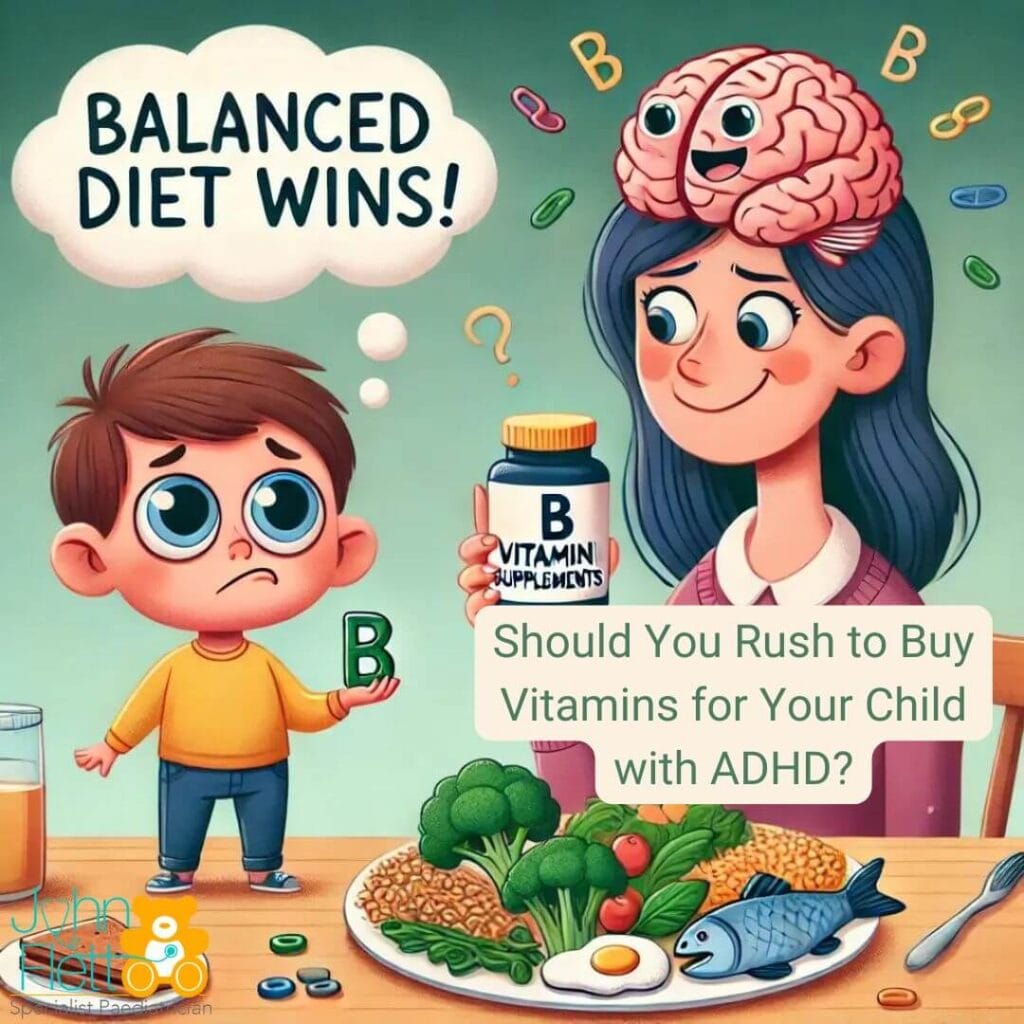Vitamin B Group and ADHD: Current Evidence and Nutritional Considerations

The use of B vitamins in the treatment of ADHD (Attention-Deficit/Hyperactivity Disorder) has been explored due to their essential roles in brain function and neurotransmitter synthesis. However, the evidence supporting the supplementation of B vitamins in children who have a normal diet and no chronic diseases is currently limited and somewhat mixed.
Understanding the Role of B Vitamins
B vitamins, including B1 (thiamine), B2 (riboflavin), B3 (niacin), B5 (pantothenic acid), B6 (pyridoxine), B7 (biotin), B9 (folate), and B12 (cobalamin), are crucial for maintaining energy levels, brain function, and cell metabolism. They are particularly important in the production of neurotransmitters like dopamine and serotonin, which are often involved in ADHD.
Current Evidence on B Vitamin Supplementation
B6 (Pyridoxine)
- Role: Pyridoxine is critical in producing neurotransmitters, including serotonin and dopamine, which are essential for mood regulation and cognitive function.
- Evidence: Some studies have looked at B6 combined with magnesium for treating ADHD symptoms. A few small studies have suggested that this combination may reduce hyperactivity and improve attention, but the findings are not conclusive. Large, well-conducted clinical trials are lacking.
- Conclusion: While there is some preliminary evidence supporting B6, it is not strong enough to recommend routine supplementation in children with a normal diet.
B12 (Cobalamin) and Folate (B9)
- Role: B12 and folate are necessary for DNA synthesis and neurological function. They also play a role in the metabolism of homocysteine, an amino acid associated with neurological disorders when present in high levels.
- Evidence: Research specifically on B12 or folate supplementation for ADHD in children is limited. Some studies suggest low levels of these vitamins might be associated with cognitive impairments, but this does not necessarily translate to improvements in ADHD symptoms in those without deficiencies.
- Conclusion: There is insufficient evidence to support B12 or folate supplementation in children with a normal diet for ADHD treatment.
Other B Vitamins
- B1 (Thiamine), B2 (Riboflavin), B3 (Niacin), B5 (Pantothenic Acid), B7 (Biotin): These vitamins are vital for overall health, but there is little evidence linking their supplementation to improvements in ADHD symptoms in children without deficiencies.
- Conclusion: These vitamins are important for general health but do not have strong evidence supporting their use specifically for ADHD treatment.
Natural Sources of B Vitamins
Ensuring that children receive adequate B vitamins through their diet is crucial for overall health and brain function. Here are some food sources rich in B vitamins:
- B1 (Thiamine): Whole grains, pork, sunflower seeds, and legumes.
- B2 (Riboflavin): Dairy products, eggs, green leafy vegetables, and fortified cereals.
- B3 (Niacin): Poultry, fish, peanuts, and whole grains.
- B5 (Pantothenic Acid): Chicken, beef, potatoes, oats, and tomatoes.
- B6 (Pyridoxine): Chickpeas, bananas, potatoes, and fortified cereals.
- B7 (Biotin): Eggs, nuts, seeds, and sweet potatoes.
- B9 (Folate): Leafy green vegetables, beans, peas, and fortified grains.
- B12 (Cobalamin): Meat, fish, dairy products, and fortified cereals.
The Role of Food and Supplementation in Vitamin B Intake
For most children with a balanced diet, these food sources provide sufficient B vitamins. However, in cases where dietary intake might be inadequate, focusing on these foods can help ensure that children receive the necessary vitamins without needing supplements. For children with ADHD, a well-rounded diet rich in B vitamins can support overall brain health, though it may not specifically treat ADHD symptoms.
Current Recommendations
Given the current evidence, routine supplementation of B vitamins is not recommended for treating ADHD in children with a normal diet and no underlying health conditions. The mainstays of ADHD management remain behavioural therapy, environmental modifications, and, when appropriate, medication such as stimulants or non-stimulants.
While ensuring a balanced diet rich in essential nutrients, including B vitamins, is important for overall health, there is no strong evidence to suggest that additional B vitamin supplementation will improve ADHD symptoms in otherwise healthy children. However, providing a diet that includes a variety of foods rich in B vitamins can support overall brain function and development.
Further research is needed to explore the potential benefits of B vitamins in managing ADHD, particularly in populations with specific deficiencies. For now, focusing on a healthy, balanced diet remains the best approach to supporting the well-being of children, including those with ADHD.

Responses